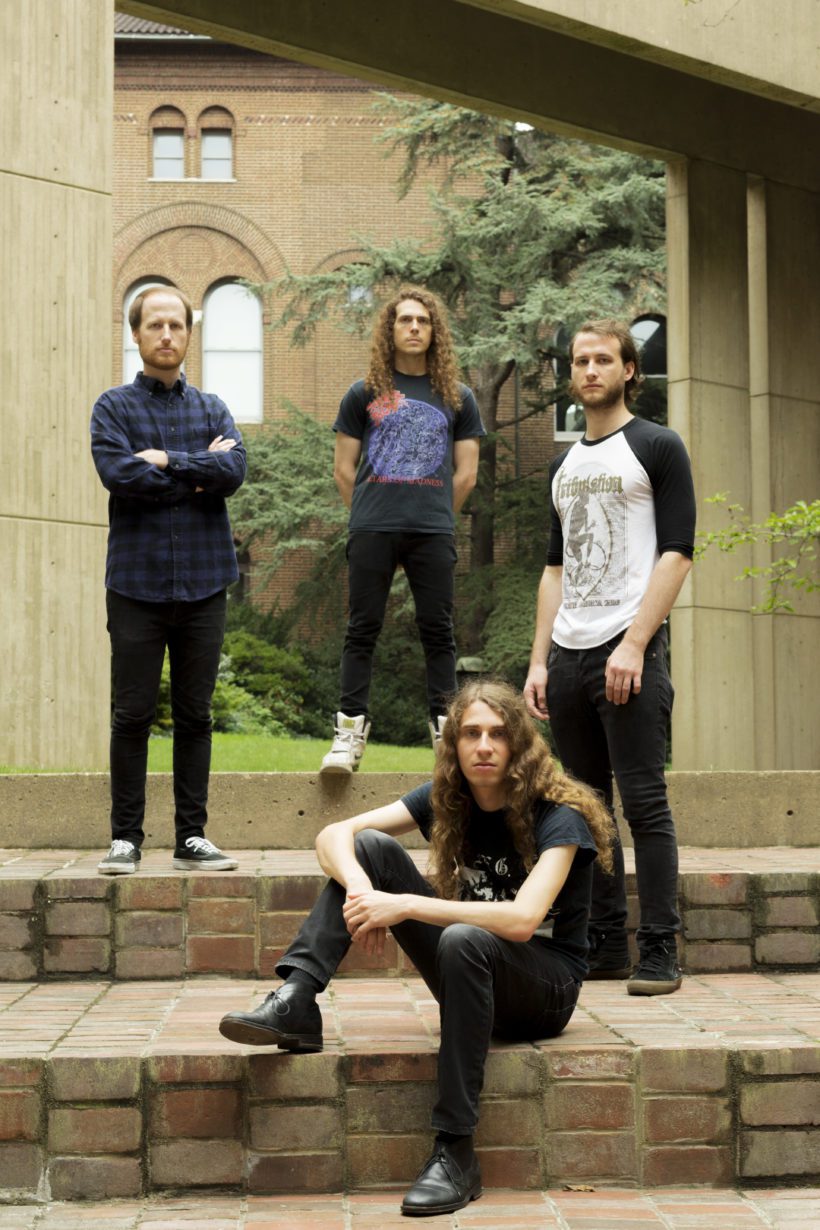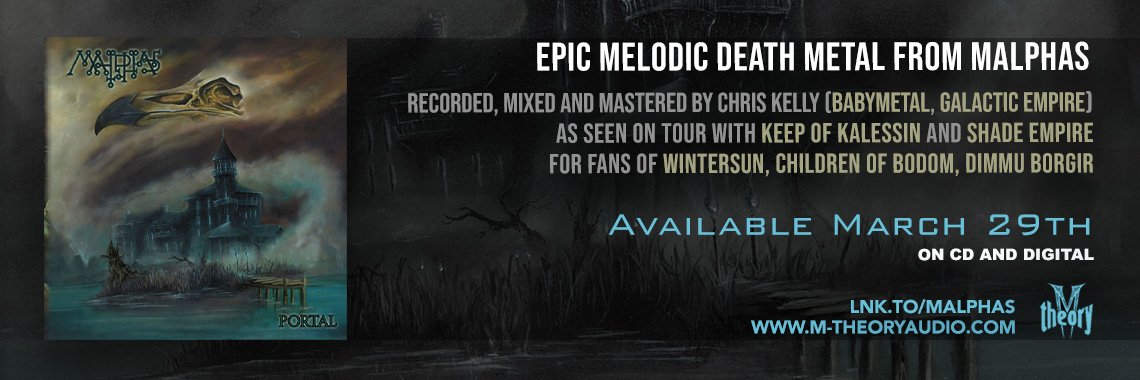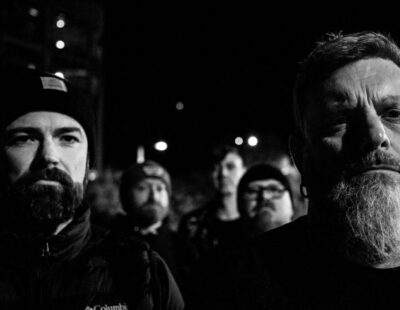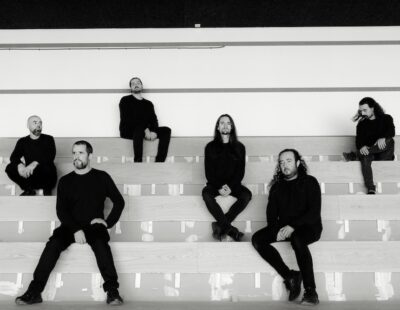
Tomorrow, death metal wunderkinds Horrendous will release their fourth album, Idol. It is a big step up for the already-advanced band in terms of composition and instrumentation — but it’s also a step into mature lyrical territory, tackling social and political themes through a horrific lens. Vocalist Matthew Knox doesn’t beat the listener over the head with his thoughts on our current president and the cascade of fear that swept him into power, but the message is there for those with eyes to see. Or, you know, anyone with a lyric sheet.
I interviewed Knox in the latest issue of Decibel but left most of the lyrical portion of our interview out of the final piece due to space constraints Below is our lightly edited conversation about the band’s lyrics.
“Soothsayer, the first track proper seems pretty politically minded, I’m thinking of the line “I am bias weaponized.” It’s difficult to read that and not think of, if not Trumpism in its physical forms, then at least the news media conglomerates which galvanized his base. Am I off-base?
You aren’t! You’re right on the money. I have been fascinated lately by the increased radicalization of political and personal beliefs, and this inspired the idea of writing lyrics personifying the more intangible, underlying force — Fear? Human nature? — that seems to be responsible for tearing down the facade of civility that people formerly had, galvanizing them to become more violent, less tolerant, and more willing to fight tooth and nail for their beliefs. The song also explores the symbiotic — or perhaps parasitic — relationship that people seem to be developing with their personal and political inclinations — they are so fully self-identified with these systems of belief that their sense of self has become inextricably linked to the ideology to which they subscribe.
The ‘title’ track, “Idolator,” seems to continue in a similar vein, with lyrics like “And who can we trust / On this nightmare witch hunt / This haunted millennium?”. Why make this song the mission statement, of sorts, of the record?
Rather than a mission statement, I see this song as the most direct representation of the themes of Idol — a statement on figures in power and the people who, either directly or indirectly, give them license to rule. I chose the title due to its biblical implications, referring to both those who prop themselves up as gods and those who worship them as such. I also loved the parallelism between the worship of false gods in the past and the praise of glorified demagogues in the present, and I took more than a bit of pleasure in embodying the condemnatory voice of the harbinger of doom at the end of the song.
There is a certain school of thought in metal, which is prevalent, that says the genre exists foremost if not exclusively as a form of escapism. The lyrics on Idol do not strike me as escapist, though they are certainly in a literary sense fantastic. What is your stance on escapism vs. topical address?
I understand the idea that metal is predicated on escapism, but I think metal differs from typical escapist outlets in that it isn’t about mere entertainment or distraction from ‘real’ problems. I honestly believe that most people who really love metal cling to it so fiercely because it is a talisman of sorts against feelings of alienation, inadequacy, or a lack of personal agency. I think lyrics have often taken a back seat in metal because the raw power and emotion of the music is the primary vehicle through which these ideas are expressed, so the lyrics become more of an afterthought or are merely meant to heighten the experience of the music they compliment. While I don’t have a problem with lyrics in metal that only aim to entertain or add layers of atmosphere to compliment the music, I’ve found that as I’ve grown older I’ve personally wanted our music to be more challenging in its sonic and lyrical offerings. There are two underlying reasons for this: I think our culture is becoming saturated with easily digestible entertainment that is escapist in its truest, most negative sense, and I ultimately didn’t want to take part in generating more throwaway distraction; I wanted to make something challenging that forces the listener to truly engage with the art, both musically and lyrically. Secondly, songwriting provides a great space for us to work out and truly explore our own ways of thinking and feeling. At its core, our music is a tangible expression of what we are feeling in the moment and it is therefore impossible for it to be divorced from the emotions and headspaces that give rise to it. In short, I think our lyrics have to be topical because they are so often a product of the ideas and events we experience in our lives.
In these lyrics I get a little whiff of Chuck Schuldiner’s observations on Spiritual Healing, but also what Hetfield was going for with Master of Puppets.
I have to confess that Spiritual Healing has always been my least favorite Death release. For some reason, I just could never fully get into it. I do appreciate the lyrics on the album though — despite some laughable parts like the “she’s a stupid bitch” line — particularly in their intent if not their execution, and I definitely took some inspiration from that band in general when stepping into the world of topical lyric writing. I do think that being too direct with a ‘message’ in metal lyrics can seem out of place in a way that it doesn’t in punk music, though, which is why I think more punk influenced metal genres really excel when writing topical, political lyrics. So I personally try to find ways of expressing my thoughts in a format that works with the atmosphere of the music. I think Master of Puppets succeeds pretty well in this department, though I have to say my upbringing in punk music was more of an influence on the lyrical content of Idol than any metal band.
Given that those records establish a kind of lineage of the sort of observations you’re making with Horrendous, why do you think other parts of the genre resolutely avoid any sort of critical, sociological lyric as established above?
I think that hearkens back to what you said earlier about escapism: most people would rather be able to mentally check out and enjoy themselves for 45 minutes than be faced with more problems. I also think tradition plays a huge role in this issue. Historically, metal has usually avoided these topics, and since metalheads are generally very fearful of disrupting tradition and the dogma of the genre, change is met with some hostility.
Do you feel you have any sort of obligation, as a lyricist? to yourselves or listeners?
I think I do feel a sense of obligation to avoid feeding the machine of throw-away cultural artifacts and distractions. I don’t know if I have achieved that, but I think the attempt to make something that is meaningful and challenging, at least as I see it (getting into the larger discussion of objective artistic worth and meaning is a separate can of worms I don’t want to open here!) is a worthy pursuit. The way I see it, why shouldn’t we create a space within metal that accommodates serious discourse on ideas of substance?
Are there any other lyricists, in any genre, which you could cite as an inspiration?
Growing up, I remember the first band that really got me thinking was Propagandhi. Though I don’t see them as a stylistic influence regarding my own lyrics, I was profoundly affected by their ability to intelligently address topics that carried enormous political and social weight, as well as their philosophy that music should be a vehicle for substantive topics.
I’ve also recently found that Dio’s lyrics — across all of his projects — have really started to hit home. There’s so much wisdom in his work that is disguised by the outer layer of seemingly goofy fantasy elements that often populate his songs, and I think they often communicate something much more profound. His lyrics remind me of eastern poetry in a way — simple in appearance but packing a great density of thought and emotion, often only revealing itself after many listens.






